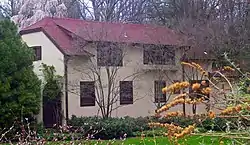John Philip Sousa House
The John Philip Sousa House, also known historically as Wildbank, is a historic house at 12 Hicks Lane, overlooking Manhasset Bay, in Sands Point, New York. Built in 1907, it was the home of composer and bandleader John Philip Sousa (1854-1932) from 1912 until his death. It was declared a National Historic Landmark in 1966.[1][3] It is still a private residence and is not open to the public.
John Philip Sousa House | |
 Front cottage of Wildbank, 2008 | |
  | |
| Location | 12 Hicks Lane, Sands Point, NY |
|---|---|
| Coordinates | 40°50′38.17″N 73°43′49.15″W |
| Area | 1.6 acres (0.65 ha) |
| Built | 1907 |
| Architect | A. B. Trowbridge[1] |
| NRHP reference No. | 66000532 |
| NYSRHP No. | 05970.000156 |
| Significant dates | |
| Added to NRHP | October 15, 1966[2] |
| Designated NHL | May 23, 1966[3] |
| Designated NYSRHP | June 23, 1980 |
Description and history
The John Philip Sousa House is located on a bluff overlooking Manhasset Bay on the North Shore of Long Island in the Sands Point area of North Hempstead. It is a rambling 2+1⁄2-story frame structure with a brown stucco exterior and a red tile roof. Its main block has a gabled roof oriented north–south, with a two-story wing extending east off the northern end. Porches extend along the western facade of the main block (overlooking the bay) and the south side of the wing. Outbuildings on the property include a stable and carriage house, an L-shaped structure near Hicks Lane, which has an apartment on the upper level. Near the waterfront there is a small teahouse.[1]
The house was built in 1907 for architect Alexander Buel Trowbridge as his summer residence. It was purchased in 1915 by John Philip Sousa, and remained his home until his death in 1932. During Sousa's ownership, the property was known as "Wildbank". Sousa was instrumental in elevating wind ensembles and marching bands to a high level of prominence and popularity, both as a conductor of the United States Marine Band, and as the composer of hundreds of marches, many of which remain staples of the band literature.[1]
See also
References
- Richard Greenwood (May 30, 1975). "National Register of Historic Places Inventory-Nomination: John Philip Sousa Home" (pdf). National Park Service.
{{cite journal}}: Cite journal requires|journal=(help) and Accompanying photos, exterior, from 1975 (1.09 MB) - "National Register Information System". National Register of Historic Places. National Park Service. January 23, 2007.
- "John Philip Sousa House". National Historic Landmark summary listing. National Park Service. September 11, 2007. Archived from the original on October 7, 2012.
External links
Gallery
 The house in 1975
The house in 1975

